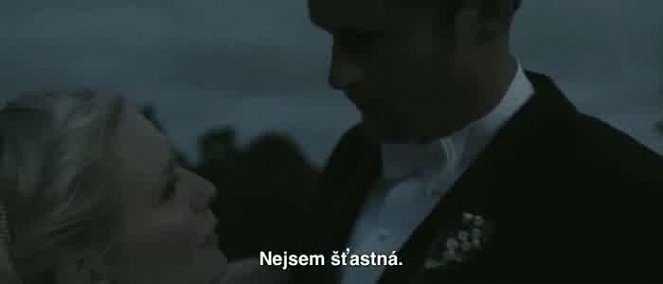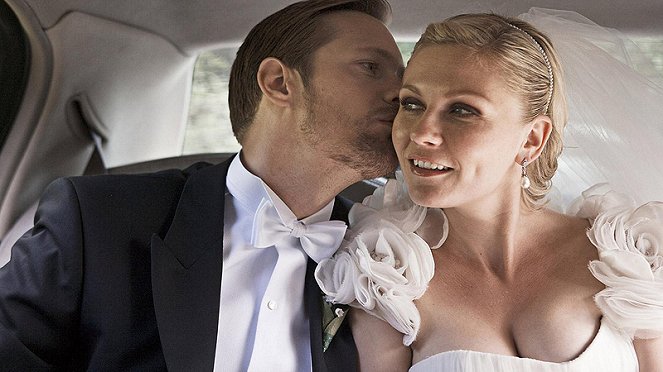Directed by:
Lars von TrierScreenplay:
Lars von TrierCinematography:
Manuel Alberto ClaroCast:
Kirsten Dunst, Charlotte Gainsbourg, Kiefer Sutherland, Charlotte Rampling, Udo Kier, Alexander Skarsgård, Stellan Skarsgård, John Hurt, Jesper Christensen (more)VOD (4)
Plots(1)
Justine (Kirsten Dunst) and Michael (Alexander Skarsgård) are celebrating their marriage at a sumptuous party in the home of her sister (Charlotte Gainsbourg) and brother-in-law (Kiefer Sutherland). Meanwhile, the planet, Melancholia, is heading towards Earth... Melancholia is a psychological disaster movie from director Lars von Trier. (Magnolia Pictures)
(more)Videos (2)
Reviews (9)
A pure pleasure. The opening is flawless, the finale fatal. It is excellent for lovers of Richard Wagner and Kirsten Dunst's bust and dimples. The pleasure is multiplied, of course, in the Justine section, which has everything and lacks nothing. Humor is combined with absurdity and symbolism. Why waste the primitive aspects of Udo Kier when we have Alexander Skarsgård's wonderful newlywed games? He hasn't been this close to orgasm since True Blood, and that's saying something.
()
My first meeting with Lars von Trier went very well. After the breathtaking introduction I was sorry I didn't catch Melancholia in the movie theatre. After the first part I was delighted and after the following part I was slightly confused but still extremely satisfied. The combination of handheld "earth" camera, "space" views (of which there are not many), music (Wagner!) and perfect acting performances (with the unbeatable Kiefer Sutherland in the lead) was a success. I probably didn't understand everything, but that's why I'll gladly watch the film again in the future.
()
In a way, what is typical of most of Lars' films (namely the huge emotional tension and very powerful intensity of the whole work), Melancholia lacks. I write "in a way" because Melancholia richly compensates for this deficit with its tight, masterfully evoked atmosphere, which especially in the final half escalates to the highest heights in its melancholy. Formally, Melancholia follows Antichrist (the extremely slowed down shots and the perfect composition of the image in the opening sequence are once again breathtaking – plus Wagner's biting melody gives it all the right drive:)) The thing I probably appreciate the most about the entire film is the fact that I was interested the entire time in seeing how the main characters would turn out, something I can't say about the VAST majority of films with similar themes. So, Lars von Trier is again very original in at least one thing – he chooses a sci-fi movie about the end of the world and uses this "banality" (banality in the sense that this theme has been used countless times in movies and the message of similar movies is usually very similar, if not the same) to depict warped family relationships in a very evocative way, and again he lets the viewer watch the despair and melancholy spill over from one character to another throughout the film. While it didn't feel as "gut-wrenching" at the end as Breaking the Waves, Dancer in the Dark, or Dogville, that didn't change the fact that I couldn't get the film out of my head for a few days).
()
There aren't many male authors who write out their feelings and then let women play it out. I consider Melancholia one of the most honest authorial statements of recent years and the opening prologue with slow motion shots and Richard Wagner's impressive music an aesthetic orgasm. What the 19th hole meant is, I don't think, very indicative (I can already see Von Trier laughing under his beard as he reads the various nonsensical explanatory theories).
()
It's not nearly as layered and symbolically connected and confusing as Antichrist. Actually, it's pretty unbalanced. The first part (Justine) is a classic raw probe into the "ceremony", in which, under the pleasing façade of luxury, hides the mud of pathological relationships and the utter emptiness of modern times (the scene in which the heroine frenetically changes the opened reproductions of modernist paintings behind the canvases of Breughel and Caravaggio, the episode with the advertising agency and the ideal slogan). The inspiration for Vinterberg and Lars' roots in Dogma 95 is more than obvious here. The whole thing is drawn to the unforeseen treacherous and dark Kirsten Dunst, who seems to be an earthly reflection of the approaching planet Melancholia - attractive, destructive, unpredictable. The second part, named after Justine's "settled" sister Claire, is a strangely monotonous wait for disaster, with Trier shifting perspective somewhat from the inside of the characters to the sky from which doom approaches. Some of the dialogues, even with hindsight, feel stretched and a little empty, but the overall vibration is powerful, with the ending being the most powerful. The strange static and passivity of the characters is actually exciting when compared to the obsessive "worldly fixers" of American movies. Justine's condemnation hovers over Melancholia like a memento: Life on Earth is evil. There's no point in looking for philosophy and message in that. Trier focused on the characters and the massively gradating wave of feeling that flounders between heaven and earth, laughter and sadness, love and hatred. Melancholia really left me with a deep melancholy. There's no point in asking why. Melancholy doesn't have a clear origin. It's like the planet. It just emerges behind the sun one day and then crashes mercilessly. It doesn't really matter how many rational complaints you can make about von Trier's new film. It is above all a pure and beautiful fetish. If you're from the same blue-green planet as Lars, of course.
()



Ads